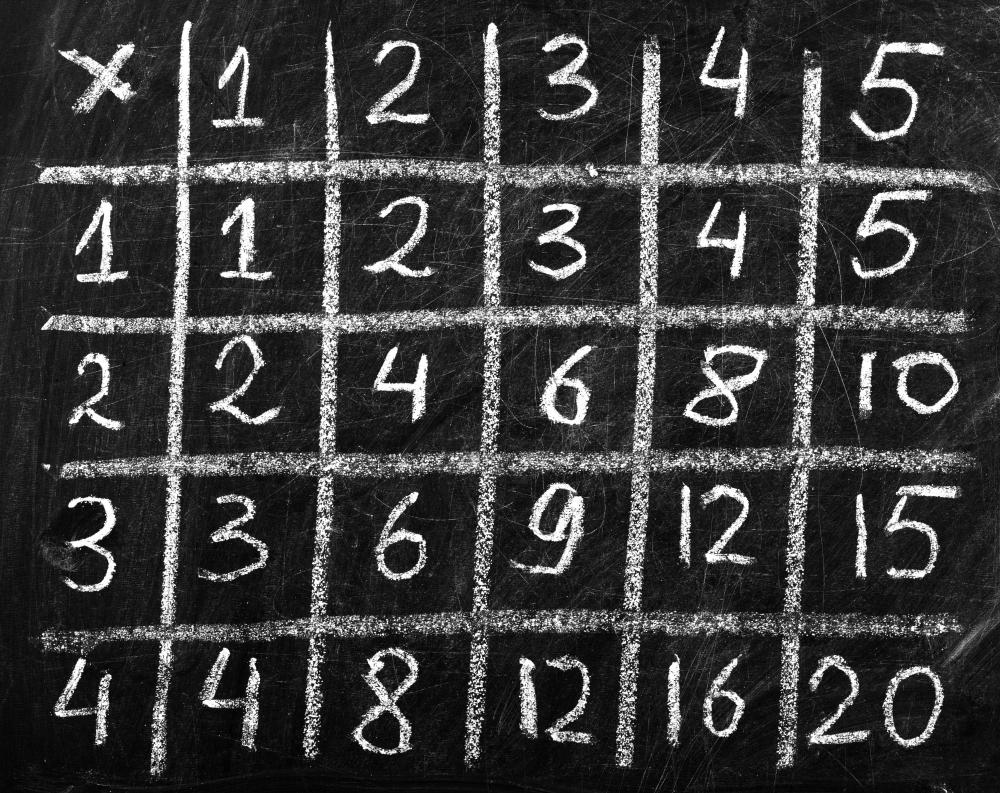At WiseGEEK, we're committed to delivering accurate, trustworthy information. Our expert-authored content is rigorously fact-checked and sourced from credible authorities. Discover how we uphold the highest standards in providing you with reliable knowledge.
What Are Some Common Learning Disabilities?
Learning disabilities or learning disorders may affect about 10-40% of the population, depending upon the particular study. At the high range, some of the children who are diagnosed with a learning disability may actually have learning "differences," which don't fit within the "normal" standard of learning. How these are considered as learning disabilities is that standard schooling is more difficult for those who are affected. Both learning disabilities and differences change the way a person learns in the school setting, and may have a negative effect on those students who are expected to conform to more common learning standards.
Further, when they are not noticed, it can seriously impact school performance for most of a student’s school career, and may result in students being accused of not trying, being lazy, or being unmotivated. It is rarely the case that a learning disability means a student is less motivated, especially at an early age. Yet several years of struggle when learning disabilities go unrecognized means that the student becomes less motivated since he or she has come to expect criticism and failure. He or she may no longer want to try if academic experiences have been overtly negative.

Common learning disabilities can be split into several groups. Perhaps the most common are attentional disorders, such as attention deficit and hyperactivity disorder (ADHD or ADD). This condition is to some people misdiagnosed significantly, and appears to most affect boys. When it is misdiagnosed, especially in elementary school, it can mean children have simply not yet reached the developmental milestone that allows them to focus and concentrate in class. In most cases, it is hard to tell before a child is eight or nine years old whether true ADHD exists. Persistent inability to remain focused on classwork, and no improvement in this area after several years of school is key to making a clear diagnosis of ADD or ADHD.

Other common learning disabilities may affect a way a student performs in certain academic areas. For instance, dyslexia is a common disorder that means students see words and shapes differently than other students. This can make learning to read and write near impossible without intervention. By using various techniques, especially early in a child’s school career, dyslexia can be addressed and the child can become a marvelous student.

Another learning disability that can cause very tough times in classrooms is dysgraphia. This is the inability to write legibly, produce letters consistently, and remember how to make letters, or keep the size of letters consistent. Dysgraphia is a challenge for many intelligent students, whose verbal performance is often well above that of other students. Since they verbally appear so intelligent, their inability to turn in work because of slow writing production is easily classed as lazy by uninformed teachers. Fortunately, with intervention, many of these students may also be helped, usually by using a keyboard rather than pen and pencil for answers. Teachers can also modify curricula so that students may give answers orally or in multiple-choice form.

Dyscalculia tends to affect students in learning math. Some parents and teachers believe that subscribing to a math tutoring service should help with this condition, but this isn't guaranteed. However, there's no harm in doing it since it will still be beneficial to a child's development. Students may be unable to memorize multiplication tables, or even master basic adding and subtracting. As math work relies on these foundations, dyscalculia can become progressively worse. It’s important to realize that even with assistance and tutoring, some students may not fully overcome dyscalculia, which makes it very hard on these students. That doesn't mean you shouldn't try. Unless you have worked with several expert online math tutors, you shouldn't give up on your child's ability to eventually learn and master math concepts and ideas. Standardized high school exit examinations may disallow use of a calculator, even though a student has this condition, and even if a student understands how to apply the math, but not how to compute it. This means students with dyscalculia may not graduate, unless given leave by an administrator to do so.

None of these common learning disabilities, and there are several others, like visual or perceptual conditions, mean that a child is not intelligent. Yet they may have to work much harder than their peers in order to produce the same amount of work, and without knowledge of their condition, they can be in for a tough road in the standard public school setting. There is fortunately greater knowledge of the common learning disabilities now, and greater chance of discovering and diagnosing these conditions when children are young so that they can receive the best possible help from special education teachers and staff. Parents may also opt to enroll their kids in private tutoring lessons to help them catch up. Online classes put less pressure on kids and give them ample opportunities to clarify things they find hard to understand without worrying they're delaying classmates like in a traditional school setting.
AS FEATURED ON:
AS FEATURED ON:

















Discussion Comments
When a teacher says a child could be IM what does that mean?
My son is seven and half. It was shocking to know from his teacher that he needs special education as he has difficulty in understanding. Two years of personal teaching and a tutor at home have brought significant change, but he is still not on par with his colleagues.
His marks are good, but I am in the dilemma that putting hi in special classes with the regular school will label him as the one needing attention and he may further go down.
mmcwhoters: We have a lot of similarities. My son just turned 12. He was born with low blood sugar and low body temperature. A very fussy baby and an emergency delivery. He was held back in kindergarten but it did not help. He has struggled with school every year. He has not been diagnosed with ADHD or ADD, just a learning disability and depression.
I feel like I'm at my wits' end with school work. He is in regular class but has time where he gets "special" attention from the special education teachers. He gets all tests read to him. He was diagnosed with a speech delay at the age of two and was in first steps. They say he is working at or right below grade level but I do not see it. They pass him with D's and some F's.
I feel if he is getting help (and I do study with him at home also daily) that he should not be getting D's or F's but C's. He gets extremely upset and frustrated when I help him.
that's exactly what I was thinking, petit mal seizures. I happened to be on an elevator today and noticed a young girl with those symptoms and she proceeded to have a bigger type of seizure. Good thing I called for help, I was at a community college at the time. I felt bad for the poor girl, she was all alone, young and tiny.
rick moyer - and others: there is a light at the end of the tunnel. please read all.
I have a 15 year old boy w/ADD. Mild symptoms started in kindergarten. It became more apparent as he got older.
We couldn't stand it anymore, and put him on meds just to get him through the eighth grade (he was on meds only 1 year). Ninth grade didn't do well. Frustrated at start of 10th grade, I looked into private schools, alternative schools, etc. I also called his present public school's "District Office" and she said "sounds like you need a 'student study team' meeting."
She asked the schools' psychologist office to set up an appointment to discuss my son's and our concerns. They scheduled testing for him, and he is eligible for the Special Education Resource Specialists Program. There is also a Special Day Program which is more intense - ask the school's psychologist if your child qualifies. --S Macey
I have a 15 year old son. He has struggled all his life with learning. We have had him in Private schools, public school, specialty school and even tried to do some homeschooling. He is presently in the best public school in the state but he is still failing. I presently do approx 4 hours a night of homework with him. Does anyone know of a home school program that would benefit the situation we are in?
I often wonder if there is a connection to my son's learning disability and the fact that he was born with low blood sugar and low body temperature. I had an emergency c-section with him. I had requested to nurse him straight away but because he had low blood sugar he was kept in neo-natal for 2 days and bottle fed glucose. I was never able to get him to settle down and nurse properly when they finally gave him to me to nurse, unlike my other two children who I nursed for a year with great ease and comfort, I eventually weaned my son at 3 months. Even with formula he was still a very fussy baby. Is there any correlation between high doses of glucose and hypoglycemia and petit mal?
My youngest son who is 11 years old has always had a problem focusing in school, math being his biggest problem. He was held back a year in kindergarten which I felt was beneficial to him as he was young when he started school, he turned 5 the day after he started. I felt that the extra year would help him. It didn't, in fact he has struggled through all his years in elementary school. His 5th grade teacher had mentioned that in all her years of teaching she had never seen a child with such an attention deficit disorder (not ADHD), ADD. I have an appointment with my son and his pediatrician tomorrow to discuss the fact that he may have ADD. Tonight I spoke with his teacher and she said that sometimes she will look at him and he looks as though he is having a petit mal seizure, he will be totally zoned out and staring off into space. I spoke with my son tonight and asked him about the staring episodes in class, he said that when he comes out of the episode he feels like ripping the paper in front of him and shivers go down his spine...does this sound like a symptom of petit mal?
Post your comments